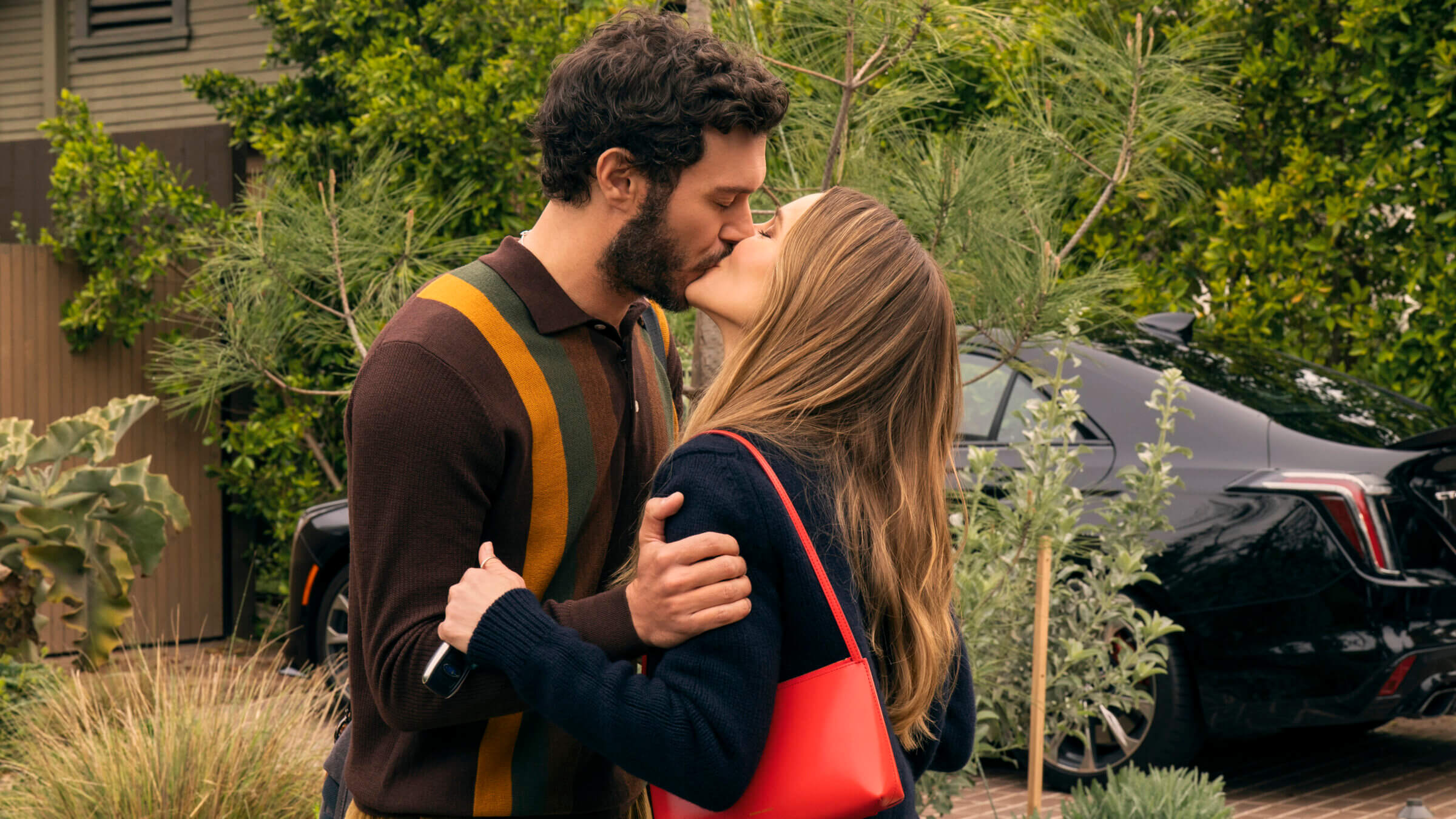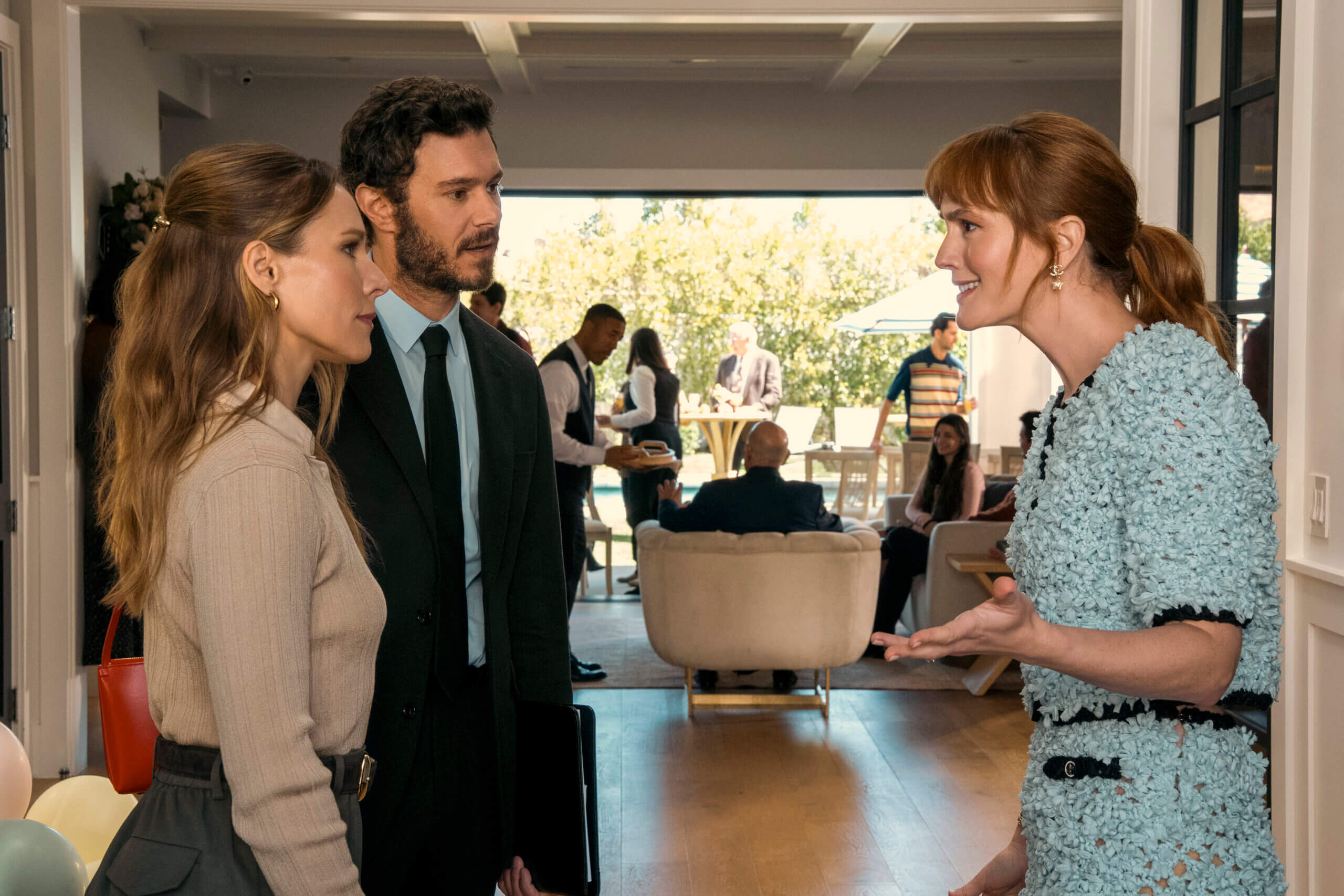What the new season of ‘Nobody Wants This’ gets right — and very wrong — about Judaism
The hit rom-com returns, addressing some of the first season’s criticisms without taking any of them to heart

Adam Brody as Rabbi Noah, and Kristen Bell as Joanne. Photo by Netflix
Spoilers ensue for the second season of Nobody Wants This, streaming on Netflix.
Despite the name, apparently everybody wanted a new season of Nobody Wants This; the first season of the comedy instantly became one of Netflix’s most-watched shows. Adam Brody charmed as Noah, a young, hot, menschy rabbi. Kristen Bell brought spunk and controversy as Joanne, his blonde, non-Jewish girlfriend. The pair had great onscreen chemistry. The writing was witty. The half-hour episodes made for an easy binge-watch.
Jews, however — myself included — had some sharper criticisms of season one, which we hoped season two might address. The Jewish women in the show were either vapid or harpies, and underdeveloped as characters to boot. And the depiction of Judaism itself wasn’t particularly enticing. Noah may have been a cool, young rabbi who smoked weed and had sex, but the show made it clear that he was the exception to the rule.
(For the record, I know many rabbis who smoke weed. Actually, the stereotype should go the other way; a recent study on psychedelics and spirituality that gave psilocybin to spiritual leaders couldn’t source enough rabbis who had not already tried a hallucinogen.)
Many — again, myself included — wondered whether the second season would take some of these complaints to heart and add some depth to the conversations around interfaith relationships, conversion, Jewish women and Judaism in general. And in a promising move, two Jews — Jenni Konner and Bruce Eric Kaplan, both of Girls fame — took over the showrunner role from its original creator, Erin Foster.
On the surface, the new season is a carbon copy of the first. Again, it is framed around the question of conversion. Noah, who has lost his promotion to senior rabbi because Joanne isn’t Jewish, admits that their relationship probably can’t progress if Joanne doesn’t convert. Joanne, who thought that the question had been put to bed — as many of us did, after the final episode of the last season in which she declared rather clearly that she would not convert for Noah — is taken aback, but decides to see if she can find a reason to fall in love with Judaism. And so we’re off to the races, with a baby naming, a Purim party, a Shabbat dinner, a conversion class.

This gives the show numerous chances to offer nuggets of Jewish learning. In the Purim episode, Noah goes beyond the usual “Purim is about getting drunk” tagline and gives a nice spiel, explaining that the holiday is a time when expectations are turned upside down. True! Another time, he points out that Judaism is about “analyzing things from every direction,” not just following rigid rules — a concept that deeply appeals to Joanne. (“A religion that encourages you to argue? Love that,” she says.)
The Jewish women are also better this year. The word “shiksa,” a pejorative that season one deployed very, very liberally, always in the mouths of Jewish women, has been erased. And Esther, Noah’s sister-in-law, has some actual plotline — we dive into her marriage to Sasha and her dreams for the future. And her snark feels more like fond ribbing than cruel jabs this season.
The show is still far from perfect — Bina, Noah’s stereotypically overbearing Jewish mother — remains a miserable, meanspirited hag. And the show’s popularity has also led to several clunky product placements and ads for Netflix. (At one point we vicariously watch a whole scene of Love Is Blind, one of the streaming platform’s reality shows, on Joanne’s laptop.)
Perhaps the show’s strongest answer to criticism of last season comes in the form of Temple Ahava, a new, very open-minded synagogue that hires Noah and immediately shows itself to be more focused on vibes than Judaism. It’s a clever, inside-baseball kind of joke; most Jews know this kind of synagogue, where ritual and text is downplayed in favor of broad, easy-to-swallow messaging. Last season, Judaism was portrayed as close-minded and rigid, unwilling to accept Joanne. Ahava is open-minded, sure — but it has lost its depth as a result.

The head rabbi — played by Seth Rogen — encourages Noah to take off his kippah. (“I’m raw-dogging the world!” he says.) Teens are encouraged to skip Shabbat in favor of movie premieres. The synagogue speedruns their conversion classes, offering a six-month version because no one wanted to sign up for a full year. Noah is skeptical; isn’t Judaism supposed to require learning and commitment? He keeps his kippah on.
It’s a powerful lesson about what makes Judaism truly meaningful. But the show undoes this exact lesson in its final scene. Joanne has been waiting all season to feel like she wants to convert. And even though she loves Shabbat and she’s picked up Jewish expressions, she doesn’t.
But Esther thinks she’s focusing on the wrong things. “I feel like you have this idea of being Jewish that’s so much more complicated than it actually is. I mean, you feel Jewish to me. You’re warm and cozy, you always want to chat about everything,” she tells Joanne. “You’re funny — that’s Jewish. You love to overshare. No matter how much I resisted, you literally forced me to be friends with you — forced. You’re a true kibbitzer. You’re always getting in everyone’s business. Ever heard of a yente, Joanne? You’re a yente.”
Joanne, she concludes, is already Jewish.
But that’s not true. Noah was right that six months is too fast for a conversion, because there’s more to Judaism than a list of facts or rules; it’s a millennia-old tradition of rich thought, text and discourse. Joanne may align with cultural stereotypes of Jews, but those are considered stereotypes for a reason — they’re shallow and incomplete. Being neurotic or anxious does not make someone a Jew anymore than being funny does.
This ending shouldn’t be surprising, however. The show’s creator, Erin Foster — who herself converted to marry her husband — rejected the critiques of the first season’s stereotypes.
“With the heaviness of what’s going on in the world around the Jewish faith,” she said in an interview with Vanity Fair about the new season, “to have a lighthearted, sweet, happy show that reminds people how beautiful Judaism is — don’t find something wrong with it! Take the win, you know?”
In response to any criticism about its reliance on Jewish tropes, the new season seems to answer that those tropes are actually core to Jewishness. Sure, season two of Nobody Wants This gets rid of the term “shiksa” and has a few nice Jewish moments. But it comes to the same conclusion as the first: Judaism is about vibes, not ritual or learning or commitment. It’s the same message Ahava offers — and like Noah realized, it’s not satisfying.
In many ways, this ending is a carbon-copy of the first season’s; in fact, the closing scenes are almost shot-to-shot identical. Last season, Joanne decided she couldn’t convert and Noah decided it didn’t matter — if Judaism was limiting them, then he’d reject Judaism. In this ending, Joanne embraces Judaism, but only because she’s decided it doesn’t actually mean that much.
















